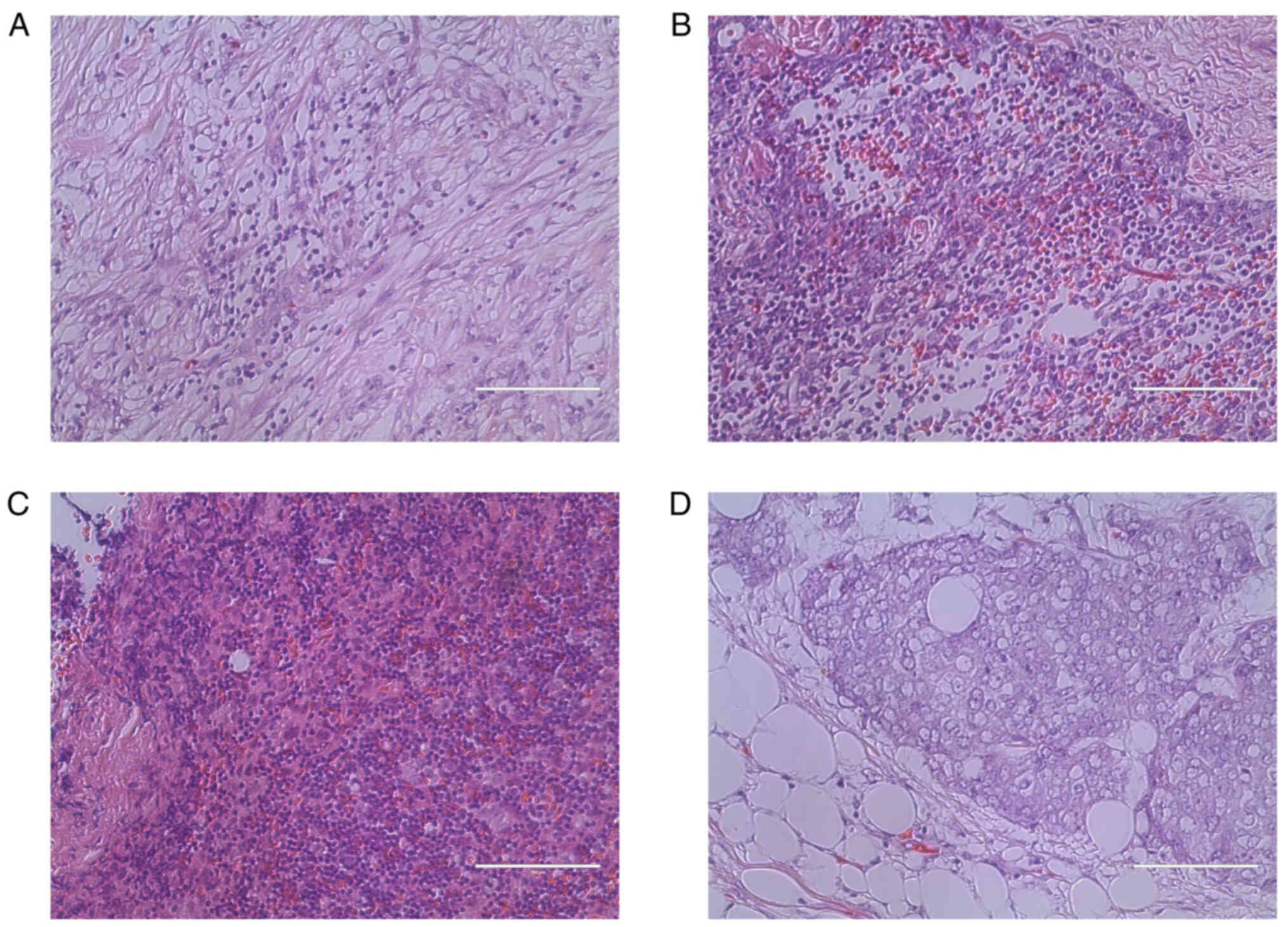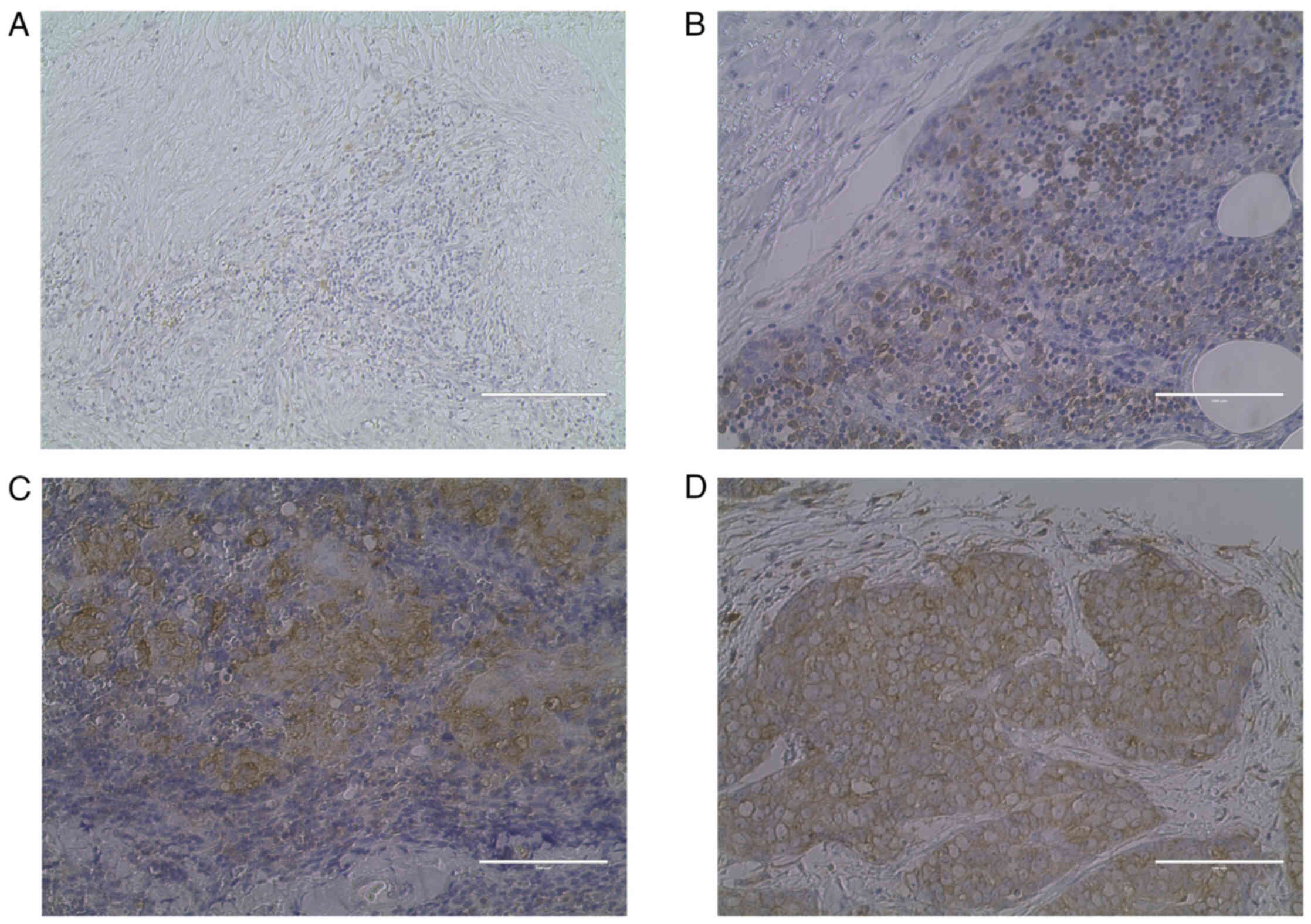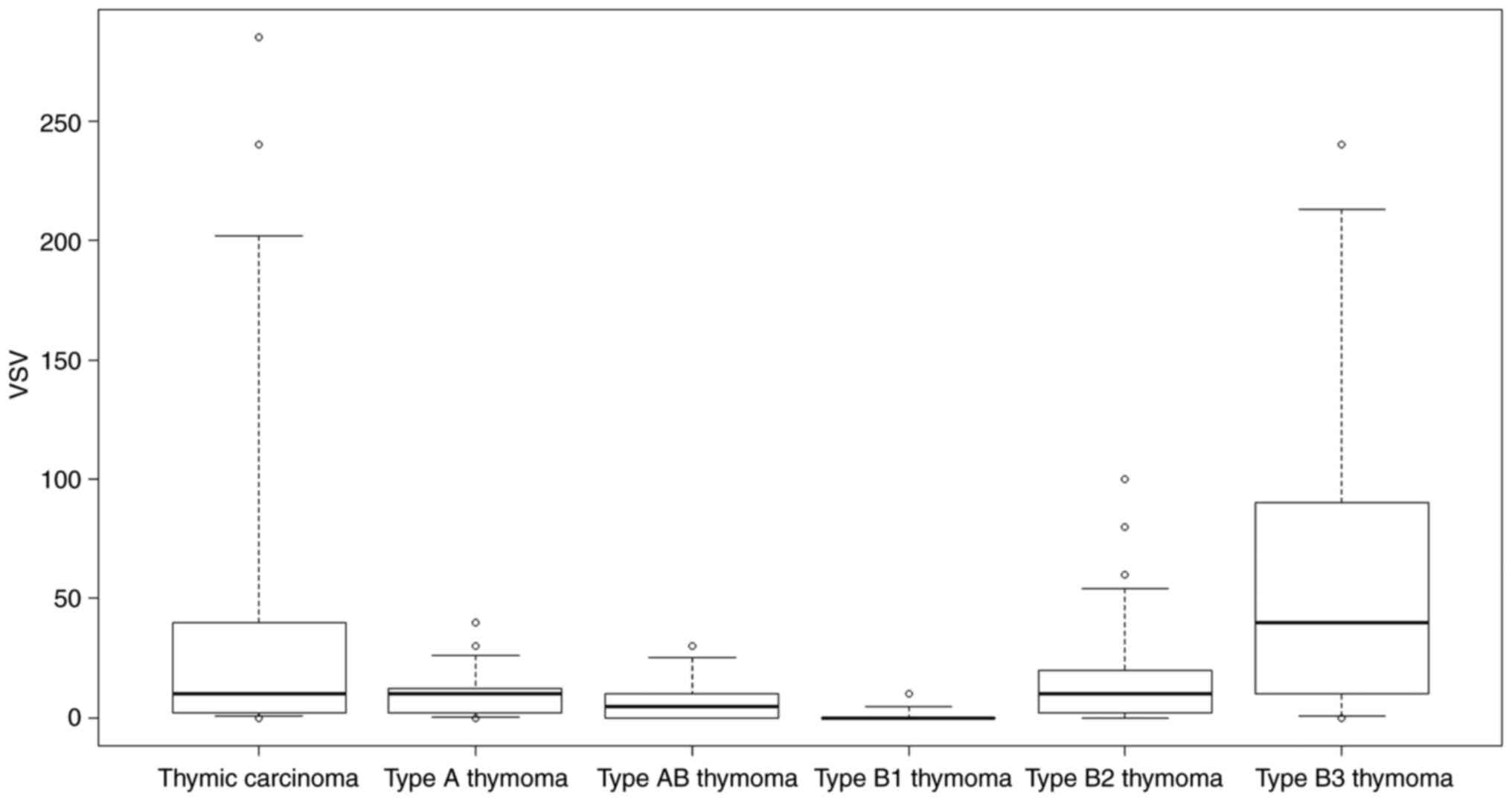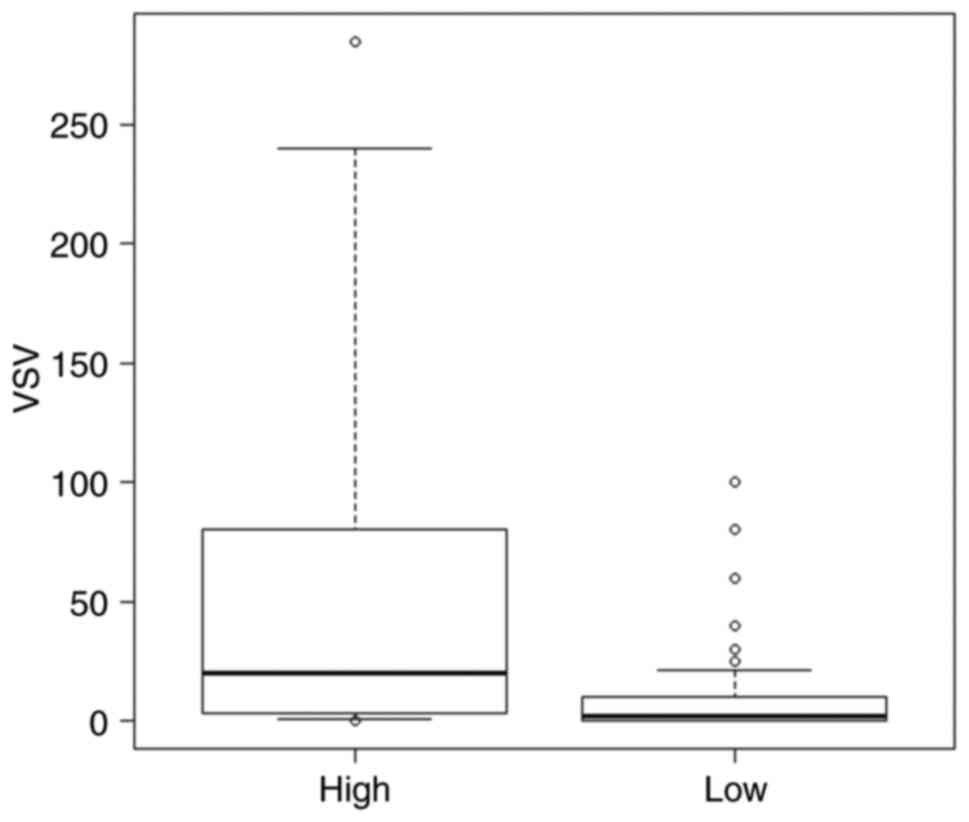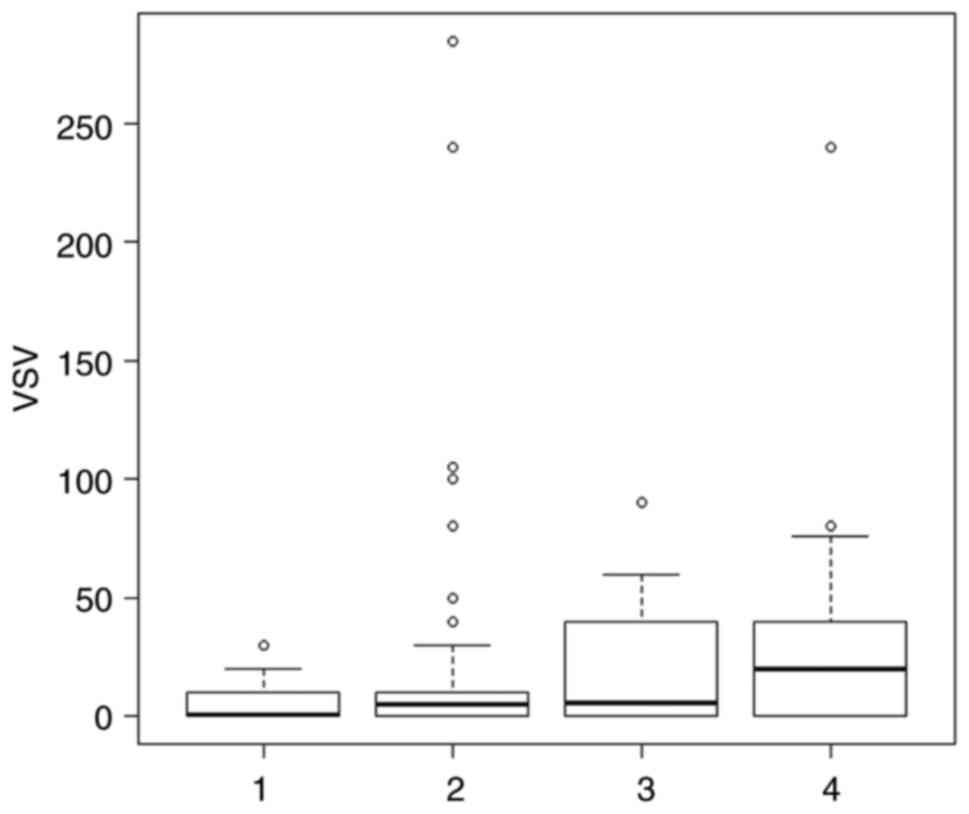|
1
|
Girard N, Ruffini E, Marx A, Faivre-Finn C
and Peters S; ESMO Guidelines Committee, : Thymic epithelial
tumours: ESMO clinical practice guidelines for diagnosis, treatment
and follow-up. Ann Oncol. 26 (Suppl 5):v40–v55. 2015. View Article : Google Scholar : PubMed/NCBI
|
|
2
|
Sato J, Satouchi M, Itoh S, Okuma Y, Niho
S, Mizugaki H, Murakami H, Fujisaka Y, Kozuki T, Nakamura K, et al:
Lenvatinib in patients with advanced or metastatic thymic carcinoma
(REMORA): A multicentre, phase 2 trial. Lancet Oncol. 21:843–850.
2020. View Article : Google Scholar : PubMed/NCBI
|
|
3
|
Zhu C, Ma X, Hu Y, Guo L, Chen B, Shen K
and Xiao Y: Safety and efficacy profile of lenvatinib in cancer
therapy: A systematic review and meta-analysis. Oncotarget.
7:44545–44557. 2016. View Article : Google Scholar : PubMed/NCBI
|
|
4
|
Luttun A, Tjwa M, Moons L, Wu Y,
Angelillo-Scherrer A, Liao F, Nagy JA, Hooper A, Priller J, De
Klerck B, et al: Revascularization of ischemic tissues by PlGF
treatment, and inhibition of tumor angiogenesis, arthritis and
atherosclerosis by anti-Flt1. Nat Med. 8:831–840. 2002. View Article : Google Scholar : PubMed/NCBI
|
|
5
|
Ellis LM and Hicklin DJ: VEGF-targeted
therapy: Mechanisms of anti-tumour activity. Nat Rev Cancer.
8:579–591. 2008. View
Article : Google Scholar : PubMed/NCBI
|
|
6
|
Cimpean AM, Marius R, Svetlana E, Cornea R
and Viorica B: Immunohistochemical expression of vascular
endothelial growth factor A (VEGF) and its receptors (VEGFR1, 2) in
normal and pathologic conditions of human thymus. Ann Anat.
190:238–245. 2008. View Article : Google Scholar : PubMed/NCBI
|
|
7
|
WHO classification of tumours editorial
board, . International agency for research on cancer: Thoracic
Tumours. 5th Edition. Lyon; France: 2021
|
|
8
|
Brierley JD, Gospodarowicz MK and
Wittekind C: The TNM classification of malignant tumors. 8th
Edition. Wiley Blackwell; Oxford: 2017
|
|
9
|
Wolff AC, Hammond MEH, Allison KH, Harvey
BE, Mangu PB, Bartlett JMS, Bilous M, Ellis IO, Fitzgibbons P,
Hanna W, et al: Human epidermal growth factor receptor 2 testing in
breast cancer: American society of clinical oncology/college of
American pathologists clinical practice guideline focused update.
Arch Pathol Lab Med. 142:1364–1382. 2018. View Article : Google Scholar : PubMed/NCBI
|
|
10
|
Kanda Y: Investigation of the freely
available easy-to-use software ‘EZR’ for medical statistics. Bone
Marrow Transplant. 48:452–458. 2013. View Article : Google Scholar : PubMed/NCBI
|
|
11
|
Imbimbo M, Vitali M, Fabbri A, Ottaviano
M, Pasello G, Petrini I, Palmieri G, Berardi R, Zucali P,
Ganzinelli M, et al: RELEVENT trial: Phase II trial of ramucirumab,
carboplatin, and paclitaxel in previously untreated thymic
carcinoma/B3 thymoma with area of carcinoma. Clin Lung Cancer.
19:e811–e814. 2018. View Article : Google Scholar : PubMed/NCBI
|
|
12
|
Petrini I, Meltzer PS, Kim IK, Lucchi M,
Park KS, Fontanini G, Gao J, Zucali PA, Calabrese F, Favaretto A,
et al: A specific missense mutation in GTF2I occurs at high
frequency in thymic epithelial tumors. Nat Genet. 46:844–849. 2014.
View Article : Google Scholar : PubMed/NCBI
|
|
13
|
Schlumberger M, Jarzab B, Cabanillas ME,
Robinson B, Pacini F, Ball DW, McCaffrey J, Newbold K, Allison R,
Martins RG, et al: A phase II trial of the multitargeted tyrosine
kinase inhibitor lenvatinib (E7080) in advanced medullary thyroid
cancer. Clin Cancer Res. 22:44–53. 2016. View Article : Google Scholar : PubMed/NCBI
|
|
14
|
Chuma M, Uojima H, Numata K, Hidaka H,
Toyoda H, Hiraoka A, Tada T, Hirose S, Atsukawa M, Itokawa N, et
al: Early changes in circulating FGF19 and ang-2 levels as possible
predictive biomarkers of clinical response to lenvatinib therapy in
hepatocellular carcinoma. Cancers (Basel). 12:2932020. View Article : Google Scholar : PubMed/NCBI
|
|
15
|
Tahara M, Schlumberger M, Elisei R, Habra
MA, Kiyota N, Paschke R, Dutcus CE, Hihara T, McGrath S, Matijevic
M, et al: Exploratory analysis of biomarkers associated with
clinical outcomes from the study of lenvatinib in differentiated
cancer of the thyroid. Eur J Cancer. 75:213–221. 2017. View Article : Google Scholar : PubMed/NCBI
|
|
16
|
Bergers G and Benjamin LE: Tumorigenesis
and the angiogenic switch. Nat Rev Cancer. 3:401–410. 2003.
View Article : Google Scholar : PubMed/NCBI
|
|
17
|
Dvorak HF, Brown LF, Detmar M and Dovrak
AM: Vascular permeability factor/vascular endothelial growth
factor, microvascular hyperpermeability, and angiogenesis. Am J
Pathol. 146:1029–1039. 1995.PubMed/NCBI
|
|
18
|
Mustonen T and Alitalo K: Endothelial
receptor tyrosine kinases involved in angiogenesis. J Cell Biol.
129:895–898. 1995. View Article : Google Scholar : PubMed/NCBI
|
|
19
|
Ferrara N, Houck K, Jakeman L and Leung
DW: Molecular and biological properties of the vascular endothelial
growth factor family of proteins. Endocr Rev. 13:18–32. 1992.
View Article : Google Scholar : PubMed/NCBI
|
|
20
|
Luo JC, Yamaguchi S, Shinkai A, Shitara K
and Shibuya M: Significant expression of vascular endothelial
growth factor/vascular permeability factor in mouse ascites tumors.
Cancer Res. 58:2652–2660. 1998.PubMed/NCBI
|
|
21
|
Detterbeck F, Youssef S, Ruffini E and
Okumura M: A review of prognostic factors in thymic malignancies. J
Thorac Oncol. 6 (7 Suppl 3):S1698–S1704. 2011. View Article : Google Scholar : PubMed/NCBI
|
|
22
|
Asamura H, Nakagawa K, Matsuno Y, Suzuki
K, Watanabe S and Tsuchiya R: Thymoma needs a new staging system.
Interact Cardiovasc Thorac Surg. 3:163–167. 2004. View Article : Google Scholar : PubMed/NCBI
|
|
23
|
Ishigami SI, Arii S, Furutani M, Niwano M,
Harada T, Mizumoto M, Mori A, Onodera H and Imamura M: Predictive
value of vascular endothelial growth factor (VEGF) in metastasis
and prognosis of human colorectal cancer. Br J Cancer.
78:1379–1384. 1998. View Article : Google Scholar : PubMed/NCBI
|
|
24
|
Ichikura T, Tomimatsu S, Ohkura E and
Mochizuki H: Prognostic significance of the expression of vascular
endothelial growth factor (VEGF) and VEGF-C in gastric carcinoma. J
Surg Oncol. 78:132–137. 2001. View
Article : Google Scholar : PubMed/NCBI
|
|
25
|
Loncaster JA, Cooper RA, Logue JP,
Davidson SE, Hunter RD and West CM: Vascular endothelial growth
factor (VEGF) expression is a prognostic factor for radiotherapy
outcome in advanced carcinoma of the cervix. Br J Cancer.
83:620–625. 2000. View Article : Google Scholar : PubMed/NCBI
|
|
26
|
Klein M, Vignaud JM, Hennequin V,
Toussaint B, Bresler L, Plénat F, Leclère J, Duprez A and Weryha G:
Increased expression of the vascular endothelial growth factor is a
pejorative prognosis marker in papillary thyroid carcinoma. J Clin
Endocrinol Metab. 86:656–658. 2001. View Article : Google Scholar : PubMed/NCBI
|
|
27
|
Hsueh C, Lin JD, Wu IC, Chao TC, Yu JS,
Liou MJ and Yeh CJ: Vascular endothelial growth factors and
angiopoietins in presentations and prognosis of papillary thyroid
carcinoma. J Surg Oncol. 103:395–399. 2011. View Article : Google Scholar : PubMed/NCBI
|















